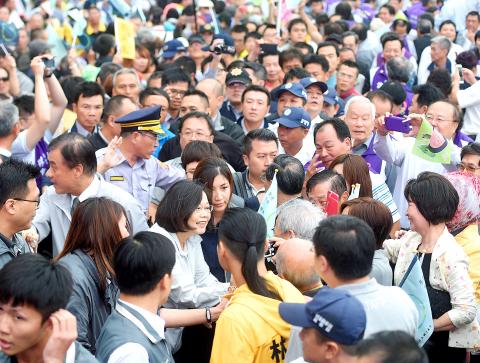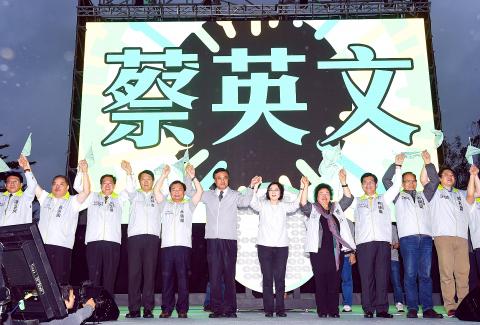Promising to lead Taiwan into a new age of tolerance, reconciliation, stability and peace, Democratic Progressive Party (DPP) presidential candidate Tsai Ing-wen (蔡英文) yesterday inaugurated her national campaign headquarters in front of a crowd of supporters in Taipei.
Tsai made her way slowly through the supporters — who greeted her with: “Hello, president,” and “victory for Tsai Ing-wen” — to reach the main stage outside of the building, where she announced its formal opening.
She asked DPP members holding public office, from borough wardens to local government heads and councilors, lawmakers, as well as support groups, to mobilize all the support they can to help the party win the January presidential and legislative elections.

Photo: Fang Pin-chao, Taipei Times
“The fight for political interests could never bring peace and prosperity for the people, and the struggle for power would not take the nation forward,” Tsai told the crowd. “Politics should be as simple as possible; it should respond directly to the needs of the people, it should help to solve the problems for the people and this is what I want to do for Taiwan.”
Tsai said that, if elected, she would form a government that makes stability and prosperity of the public a priority, adding that social progress should be the nation’s most pressing issue.
“My politics is the politics of solving problems for the people. My politics is the politics of fulfilling dreams for the people,” Tsai said, adding that she is confident she would be able to honor her words.

Photo: Fang Pin-chao, Taipei Times
Kaohsiung Mayor Chen Chu (陳菊), who is Tsai’s campaign manager, urged people to give the DPP another chance at running the nation, saying that Tsai is capable of leading the nation out of the difficulties it is facing, just as she led the DPP to stand up again following its defeat in the 2008 presidential election.
“At the DPP’s most difficult time, when it was on the verge of collapse, Tsai was brave enough to shoulder the responsibilities to lead the party,” Chen said. “Throughout the years, Tsai has led the party through storms, enabling us to see how strong, hard-working and professional she is as a leader.”
Chen said that instead of being tragic heroes who were jailed or had to constantly escape government repression — issues she said her generation of politicians faced — “Tsai represents a new generation of politicians who are calm and professional.”

Photo: Wang Yi-sung, Taipei Times
There were several booths set up to accept piggy banks filled with donations and there were long lines of supporters in front of the booths.
More than 2,000 piggy banks were submitted to the campaign headquarters during the event alone, according to DPP data.
Some waited in line to browse the “Ing Store” to purchase official campaign souvenirs, while others lined up before an automatic donation machine, which accepted notes and coins, as well as printed receipts.
The event featured musical performances, as well as a market selling locally grown agricultural products and handmade items.

AGING: As of last month, people aged 65 or older accounted for 20.06 percent of the total population and the number of couples who got married fell by 18,685 from 2024 Taiwan has surpassed South Korea as the country least willing to have children, with an annual crude birthrate of 4.62 per 1,000 people, Ministry of the Interior data showed yesterday. The nation was previously ranked the second-lowest country in terms of total fertility rate, or the average number of children a woman has in her lifetime. However, South Korea’s fertility rate began to recover from 2023, with total fertility rate rising from 0.72 and estimated to reach 0.82 to 0.85 by last year, and the crude birthrate projected at 6.7 per 1,000 people. Japan’s crude birthrate was projected to fall below six,

US President Donald Trump in an interview with the New York Times published on Thursday said that “it’s up to” Chinese President Xi Jinping (習近平) what China does on Taiwan, but that he would be “very unhappy” with a change in the “status quo.” “He [Xi] considers it to be a part of China, and that’s up to him what he’s going to be doing, but I’ve expressed to him that I would be very unhappy if he did that, and I don’t think he’ll do that. I hope he doesn’t do that,” Trump said. Trump made the comments in the context

SELF-DEFENSE: Tokyo has accelerated its spending goal and its defense minister said the nation needs to discuss whether it should develop nuclear-powered submarines China is ramping up objections to what it sees as Japan’s desire to acquire nuclear weapons, despite Tokyo’s longstanding renunciation of such arms, deepening another fissure in the two neighbors’ increasingly tense ties. In what appears to be a concerted effort, China’s foreign and defense ministries issued statements on Thursday condemning alleged remilitarism efforts by Tokyo. The remarks came as two of the country’s top think tanks jointly issued a 29-page report framing actions by “right-wing forces” in Japan as posing a “serious threat” to world peace. While that report did not define “right-wing forces,” the Chinese Ministry of Foreign Affairs was

PREPAREDNESS: Given the difficulty of importing ammunition during wartime, the Ministry of National Defense said it would prioritize ‘coproduction’ partnerships A newly formed unit of the Marine Corps tasked with land-based security operations has recently replaced its aging, domestically produced rifles with more advanced, US-made M4A1 rifles, a source said yesterday. The unnamed source familiar with the matter said the First Security Battalion of the Marine Corps’ Air Defense and Base Guard Group has replaced its older T65K2 rifles, which have been in service since the late 1980s, with the newly received M4A1s. The source did not say exactly when the upgrade took place or how many M4A1s were issued to the battalion. The confirmation came after Chinese-language media reported